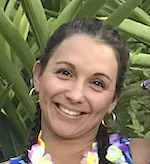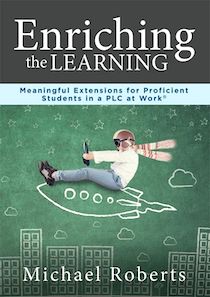PLCs Help Teachers to Plan Collaboratively
Enriching the Learning: Meaningful Extensions for Proficient Students in a PLC at Work
By Michael Roberts
(Solution Tree, 2019 – Learn more)
Reviewed by Jacqueline Barreras

Throughout the book Michael Roberts developed the idea of working as a team to learn different instructional approaches that support student learning. He provided an array of examples and research-based evidence, noting “When professionals know better, they have an obligation to do better.” (97).

At the start of the book the author explains why proficient students are important to focus on when collaboratively planning for interventions and extensions. This information is useful for new and veteran teachers expanding their professional development and wanting to bring a new approach to the school climate.
A breakdown for identifying proficient students and creating extensions through brief summaries drive home the point that proficient students are at risk if their learning needs are not addressed.
Teachers can have meaningful and purposeful conversations
What I love most about this book is how Michael Roberts set it up as a guide for launching and supporting collaborative work among teams of teachers. In addition to the structure, he offers a variety of examples from various grade levels for each procedure.
When attending professional learning communities (PLCs), our administration and my colleagues always focused on the students who were not proficient according to student data, but I always felt that this focus should not be our only goal. Every student in front of us should be provided with an educational experience that will take them to the next level. Learning never stops.
In chapters three through five, Michael Roberts provides what he calls “extensions” with samples of planned instruction around skill, interest, and social extensions. The lessons offer examples that support each type of extension and what it can look like in the classroom. He writes, “Thoughtful teams should ensure the extension groups are fluid enough to accommodate students as soon as they become proficient” (34).
Ideas worth trying and sharing
By the end of Enriching the Learning, I found myself developing an agenda and planning template my team and I can utilize to analyze student data and plan instructional extensions that meet proficient student learning needs. Simply reading the book and jotting down my thoughts was not enough. It’s become a toolbox for alternatives when collaborating with my team during our professional learning community meetings.
Throughout the book, Michael Roberts demonstrates his understanding that proficient students can be taken to higher levels to keep them motivated and inquisitive for learning, “I hope to help guide staffs, both teachers and administrators, on their journey to ensure high levels of learning and engagement in school for all students” (4). He has!
Jacqueline Barreras teaches 5th grade for the School District of Palm Beach County in Florida. She has a Master’s of Science in Elementary Education and earned High Impact Teacher status for the state of Florida. Jacqueline writes that “I love learning alongside my students to help them continue to grow. Through a growth mindset, I have been able to reach my students and meet my professional mission. I love camping with my family and reading!”




























